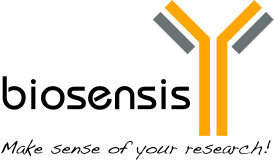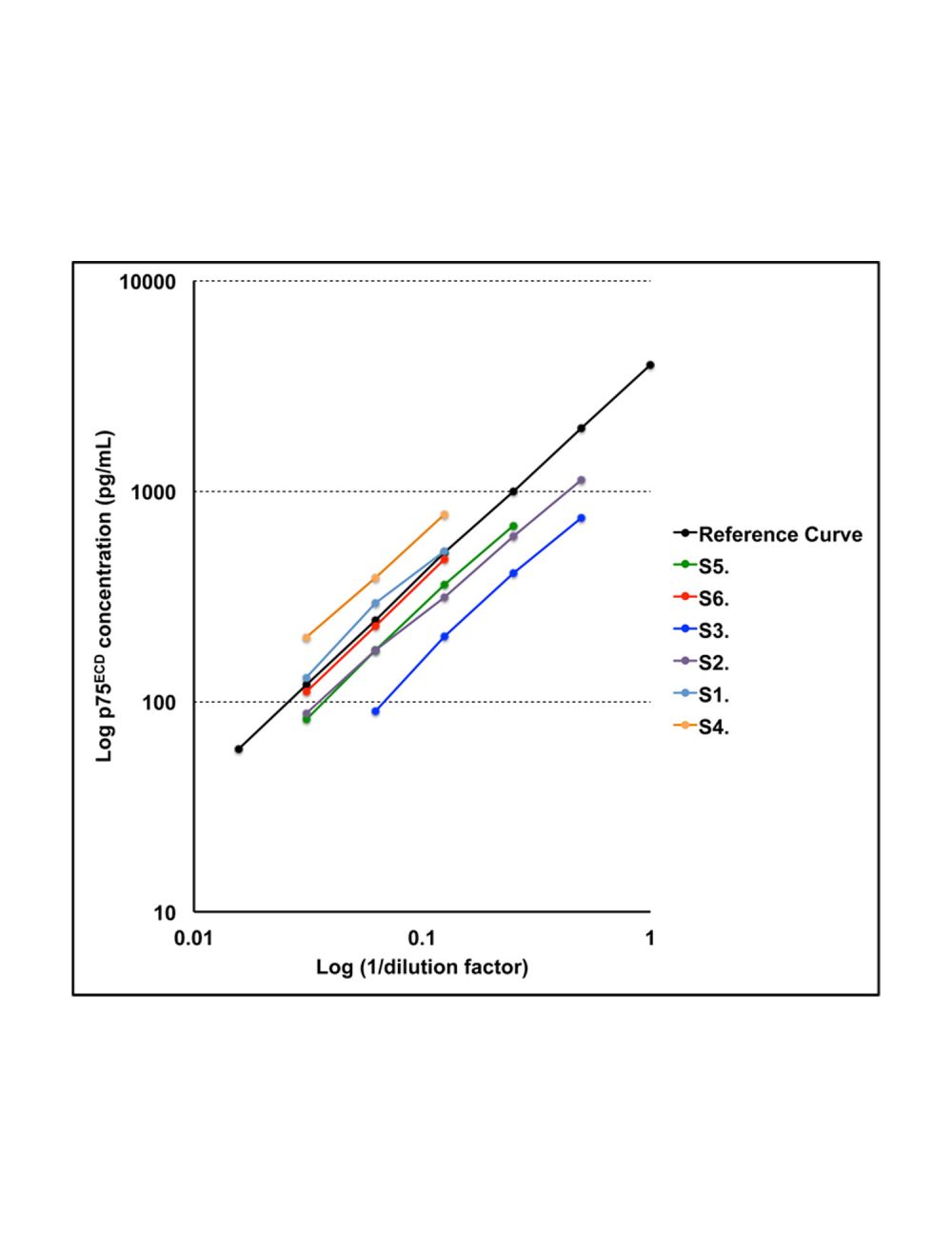Nerve growth factor receptor, extracellular domain (NGFR/p75ECD), Human, Rapid™ ELISA assay
- Product Name Nerve growth factor receptor, extracellular domain (NGFR/p75ECD), Human, Rapid™ ELISA assay
-
Product Description
The Biosensis NGFR/p75ECD RapidTM enzyme-linked immunosorbent assay (ELISA) Kit s a sandwich ELISA that allows the quantification of the extracellular domain (ECD) of human p75 neurotrophin receptor in less than 4 hours in urine only if used as directed. Please refer to the kit protocol for specific use instructions for urine application.
This ELISA kit consists of a pre-coated mouse monoclonal anti-p75ECD capture antibody, a biotinylated mouse monoclonal anti-p75ECD detection antibody and horseradish peroxidase (HRP)-conjugated streptavidin. The addition of a substrate (3,3',5,5'-tetramethylbenzidine, TMB) yields a colored reaction product which is directly proportional to the concentration of p75ECD present in samples and protein standards. A human p75ECD positive control (QC sample) is provided to assure consistent assay performance.
This NGFR/p75ECD ELISA kit employs a recombinant human p75ECD-Fc chimera. While there is a current lack of a commercially available, true human p75ECD standard, this ELISA kit allows quantification of human p75ECD as p75ECD-Fc human equivalents. Please note that the antibodies used in this ELISA do not cross-react with mouse p75ECD.
Note: For research use only. Not for diagnostic and clinical purposes. - Alternative Names Low-affinity nerve growth factor receptor; NGF receptor; Gp80-LNGFR; p75 ICD; Low affinity neurotrophin receptor p75NTR; Tumor necrosis factor receptor superfamily member 16; CD271; NGFR; TNFRSF16; NGFR/p75ECD; p75ECD;
- Application(s) ELISA
- Specificity Human. This ELISA kit does not cross-react with mouse p75ECD protein.
- Species Reactivity Human
- Immunogen Description Recombinant human p75 (AA 1-250) -Fc chimera, made in 293 cells
- Range 62.5 - 4,000 pg/mL
- Sensitivity < 50 pg/mL
- Regulatory Status For research use only.
Product Info
-
Product Description
The Biosensis NGFR/p75ECD RapidTM enzyme-linked immunosorbent assay (ELISA) Kit s a sandwich ELISA that allows the quantification of the extracellular domain (ECD) of human p75 neurotrophin receptor in less than 4 hours in urine only if used as directed. Please refer to the kit protocol for specific use instructions for urine application.
This ELISA kit consists of a pre-coated mouse monoclonal anti-p75ECD capture antibody, a biotinylated mouse monoclonal anti-p75ECD detection antibody and horseradish peroxidase (HRP)-conjugated streptavidin. The addition of a substrate (3,3',5,5'-tetramethylbenzidine, TMB) yields a colored reaction product which is directly proportional to the concentration of p75ECD present in samples and protein standards. A human p75ECD positive control (QC sample) is provided to assure consistent assay performance.
This NGFR/p75ECD ELISA kit employs a recombinant human p75ECD-Fc chimera. While there is a current lack of a commercially available, true human p75ECD standard, this ELISA kit allows quantification of human p75ECD as p75ECD-Fc human equivalents. Please note that the antibodies used in this ELISA do not cross-react with mouse p75ECD.
Note: For research use only. Not for diagnostic and clinical purposes. -
Related Products
Nerve growth factor receptor, extracellular domain (NGFR/p75ECD), Mouse, Rapid™ ELISA assay
- Application(s) ELISA
- Application Details ELISA. For the quantification of Nerve growth factor receptor, extracellular domain (NGFR/p75ECD) in Urine. Please download the detailed product insert for complete instructions for the successful use of this ELISA. Use only as directed.
- Target Nerve growth factor receptor, extracellular domain (NGFR/p75ECD)
- Specificity Human. This ELISA kit does not cross-react with mouse p75ECD protein.
- Target Cross-Reactivity (ELISA) This ELISA kit does not cross-react with mouse p75ECD protein.
- Target Host Species Human
- Species Reactivity Human
- Immunogen Description Recombinant human p75 (AA 1-250) -Fc chimera, made in 293 cells
- Range 62.5 - 4,000 pg/mL
- Sensitivity < 50 pg/mL
- Sample Type Urine
- Detection Method Colorimetric
- Kit Components The ELISA kit box contains 96-well pre-coated strip plate(s), protein standards, QC sample, detection reagents, heterophilic antibody blocker, wash and sample buffers, substrate buffer and detailed protocols.
- Storage Instructions Store at 2-8°C.
- Storage Temperature 2-8°C
- Batch Number Please see item label.
- Expiration Date 12 months from purchase.
- Alternative Names Low-affinity nerve growth factor receptor; NGF receptor; Gp80-LNGFR; p75 ICD; Low affinity neurotrophin receptor p75NTR; Tumor necrosis factor receptor superfamily member 16; CD271; NGFR; TNFRSF16; NGFR/p75ECD; p75ECD;
- Uniprot Number P08138
- Uniprot Number/Name P08138 (TNR16_HUMAN)
- Scientific Background The nerve growth factor (NGF) receptor (NGFR), also known as p75 neurotrophin receptor (p75NTR; TNFRS16; CD271) is a common receptor for the neurotrophins NGF, BDNF, NT-3 and NT-4/5. In neurons, p75NTR mediates a variety of physiological functions including survival, apoptosis, neurite outgrowth and synaptic plasticity. A potential pathological role for p75NTR has become evident in recent years. Altered p75NTR expression levels are implicated in degeneration of spinal motor neurons in human and mouse models of amyotrophic lateral sclerosis (ALS). Importantly, the extracellular domain of p75NTR (p75ECD) is shed from the cell membrane and excreted in urine. Recent findings further suggest that p75ECD could be an early biomarker for ALS in humans, as significantly elevated p75ECD levels are found in urine of ALS patients as compared to healthy controls.
- Shipping Statement For order quantities larger than 1 plate, this product is supplied in package units of 2 plates.
- Shipping Temperature 2-8°C (on cold packs)
- UNSPSC CODE 41116158
- Regulatory Status For research use only.
Specifications
-
Specific References
Covarrubias C et al. (2023) Decrease in the Ratio proBDNF/BDNF in the Urine of Aging Female Patients with OAB Metabolites. 13(6), 723. Application: Human, Urine.
Yamada S et al. (2021) Ratio of urinary N-terminal titin fragment to urinary creatinine is a novel biomarker for amyotrophic lateral sclerosis J Neurol Neurosurgeon Psychiatry 92(10):1072-1079 Application: Human Urine
-
General References
The following references give a general background on the suitability of p75ECD as a biomarker for ALS disease progression.
Shepheard et al. (2017) Neurology 2017 Feb 22. doi: 10.1212/WNL.0000000000003741. [Epub ahead of print].
Shepheard et al. (2014) PLoS ONE 9(1): e87398. doi:10.1371/journal.pone.0087398.
DiStefano & Johnson (1988) Proc Natl Acad Sci USA 85: 270-274.

 1800 605-5127
1800 605-5127 +61 (0)8 8352 7711
+61 (0)8 8352 7711


